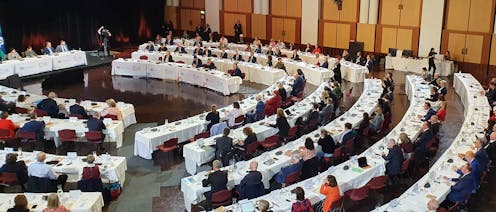Summit triggers immediate action and elevates gender equality
- Written by Michelle Grattan, Professorial Fellow, University of Canberra

The jobs and skills summit, which concluded on Friday, has been a highly-managed exercise by the Albanese government in maximising policy and political productivity.
The government went into the meeting knowing, broadly, the key initiatives it intended to announce out of it. Most importantly, this included plans for changes to the industrial relations system to try to get wages moving, and for a higher migrant intake to ease the acute labour shortages.
At the end of a day and a half, the government announced 36 measures[1] on which action will be taken this year and around the same number for further work.
One significant announcement, allowing pensioners to earn more, had been recently advocated by the most notable absentee from the summit, Opposition Leader Peter Dutton.
Pensioners will get a temporary upfront “$4000 bank credit” so they can do extra work before they lose some of their pension. At present someone on the aged pension can earn $7800 a year without affecting their pension.

















